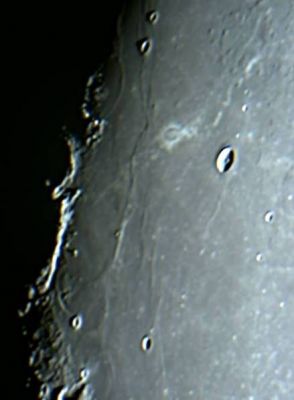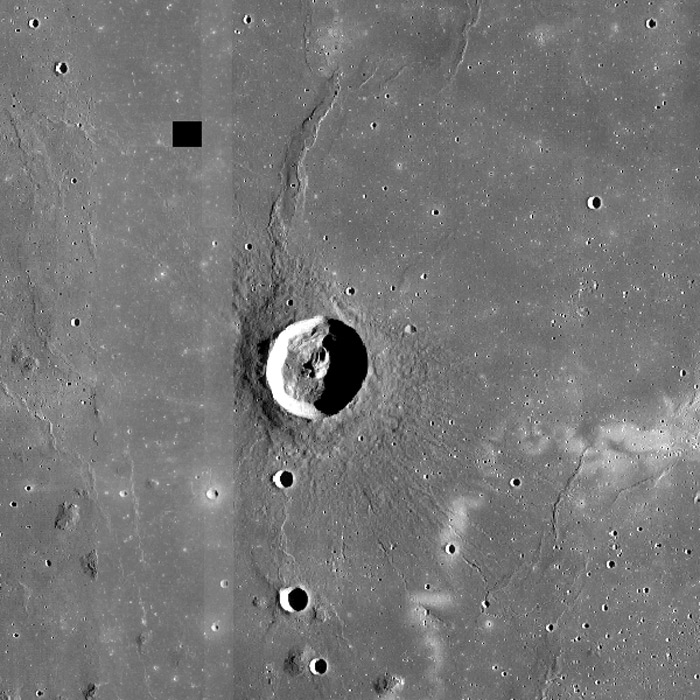Difference between revisions of "Reiner"
| Line 6: | Line 6: | ||
|} | |} | ||
<div id="toc"> | <div id="toc"> | ||
| − | + | ||
| − | |||
{| class="wiki_table" | {| class="wiki_table" | ||
| | | | ||
| Line 53: | Line 52: | ||
A Portfolio of Lunar Drawings (Harold Hill), pages 84, 85 (see also: Reiner gamma).<br /> <br /> <br /> <br /> | A Portfolio of Lunar Drawings (Harold Hill), pages 84, 85 (see also: Reiner gamma).<br /> <br /> <br /> <br /> | ||
---- | ---- | ||
| − | + | </div> | |
Revision as of 16:44, 15 April 2018
Contents
Reiner
|
Lat: 7.0°N, Long: 54.9°W, Diam: 29 km, Depth: 2.96 km, Rükl: 29, Eratosthenian |
| Helmut Groell |
LRO-WAC mosaic |
Images
LPOD Photo Gallery Lunar Orbiter Images Apollo Images
Maps
(LAC zone 56C2) LAC map Geologic map
Description
Description: Elger
(IAU Directions) REINER.--A regular ring-plain, 21 miles in diameter, in the Mare Procellarum, S.S.W. of Marius, with a very lofty border terraced without and within, and a minute but conspicuous mountain standing at the N. end of a ridge which traverses the uniformly dark floor in a meridional direction. A long ridge extends some way towards the S. from the foot of the S. wall, and at some distance in the same direction lie six ill- defined white spots of doubtful nature. On the W.N.W. there is a large white marking, resembling a "Jew's harp" in shape, and farther on, towards the W., a number of very remarkable ridges. On the E. will be found many bright little craterlets. A ray from Kepler extends almost up to the E. wall of Reiner.
Description: Wikipedia
Additional Information
Depth data from Kurt Fisher database
- Westfall, 2000: 2.96 km
- Viscardy, 1985: 2.58 km
- Cherrington, 1969: 2.59 km
- Reiner and its satellite craters K and L are on the ALPO list of bright ray craters
- Reiner and Reiner A & C are thermal anomaly craters, implying youthful ages - Moore et al, 1980
- TSI = 25, CPI = 15, FI = 20; MI =60 Smith and Sanchez, 1973
According to the book Epic Moon, page 309, the Spanish astronomer José Comas Sola (1868-1937) once saw crater Reiner "as a white patch when it should have been sharply defined".
Nomenclature
- Vincentio Reinieri (Renieri, Reiner) (March 30, 1606--November 5, 1647) was an Italian mathematician and astronomer. He was a friend and disciple of Galileo. Galileo had Reinieri update and attempt to improve his astronomical tables of the motions of Jupiter's moons, revising these tables for prediction of the positions of these satellites. His astronomical work consisted of adding new observations of Jupiter's moons to Galileo's. To some degree, Reinieri improved the Galilean tables on the motions of these satellites. Before his death, Galileo decided to place all of the papers containing his observations and calculations in the hands of Reinieri. Reinieri was to finish and revise them.Reinieri's observations of Jupiter's moons remained unpublished at the time of his premature death at Pisa in 1647.
- It's strange to see no Greek letters for the two hillocks at the southern part of the large ghost-crater Reiner R south of Reiner itself. See Chart F4 of the SLC (System of Lunar Craters). Perhaps we could call them Reiner Alpha and Beta?
- Rimae Reiner (unofficial name). It's a pleasure to explore the sinuous rilles in the region around Reiner, on the "Big Shadows" WAC of the LROC Quickmap!
- Rima Reiner K: sinuous rille northeast of Reiner, near the bowl-shaped crater Reiner K (8° North / 54° West).
- Rima Reiner M: sinuous rille northwest of Reiner, more precisely: northwest of Reiner M (9°15' North / 57° West).
LPOD Articles
LROC Articles
Zebra Stripes (east-northeast of Reiner E, south of Suess G).
Bibliography
A Portfolio of Lunar Drawings (Harold Hill), pages 84, 85 (see also: Reiner gamma).

